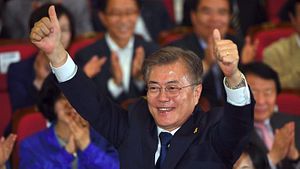South Korea’s President Moon Jae-in has just passed his two year anniversary in office, and is rapidly approaching the middle of his five-year term. As is the case with many world leaders around the midway mark, Moon is facing declining domestic approval ratings; a May 2019 Gallup Korea poll showed 45 percent of respondents indicating that Moon was performing poorly, representing a split in public opinion. This marks a clear divergence from his ratings just a year ago, which hit their highest in line with the first inter-Korean summit in April 2018.
However, unlike many other world leaders, Moon does not have to worry about re-election, with Article 70 of South Korea’s constitution imposing a single-term limit. Moon’s biggest task ahead is to avoid becoming a lame-duck leader, and to maintain enough public support to see his presidency through to the end; a recent petition calling for impeachment garnered over 217,000 signatories.
Moon’s declining popularity can be widely attributed to a rising domestic focus on his administration’s economic performance. Around half of South Korea’s gross domestic product (GDP) is export-dependent, and weak global demand for its exports, particularly electrical manufactured products such as semiconductors, has hit the country’s economy hard. This has seen GDP shrinking faster than expected in recent months, with the Bank of Korea (BOK) confirming that Q1 GDP rates contracted by a seasonally adjusted 0.4 percent, marking the largest drop since 2008. The BOK is due to issue revised annual growth figures again in July, and these are not expected to be positive; the bank has cut its 2019 economic growth forecast once already this year.
Employment rates are also in the spotlight, as this area was a prime focus of Moon’s initial economic policy. His administration’s move to raise the statutory minimum wage by 11 percent in 2019 has significantly impacted small businesses, forcing many to close and resulting in rising unemployment. The minimum wage had already risen by over 16 percent in 2018, with the costs being too high for many businesses to continue operating. The impact has seen South Korea’s unemployment benefit bill rise 58 percent in the space of Moon’s time in office. Among one of the worst-affected segments of society is the country’s youth demographic; a large percentage of whom participated in the 2016-17 Candlelight Protests to topple his predecessor.
There has been little progress on addressing bread-and-butter issues of the electorate, and this is likely to impact Moon’s Democratic Party (also known as the Minjoo Party) in the lead-up to the April 15, 2020 legislative elections. While the majority of approval ratings retain the Democratic Party as the favored party, the once scandal-hit Liberty Korea Party (formally the Saenuri Party) has seen rising approval rates in recent months. These elections will not only act as a referendum on Moon’s presidency, but will also shape his ability to pursue his policy agenda moving forward.
Another challenge is the slowing progress of the administration’s North Korea policy, with the country increasingly adopting the role of a passive observer. Moon has widely positioned himself as a mediator between North Korea and the United States. However, the failure of the February 2019 Vietnam summit, and Moon’s general absence from the conversation, has reduced his ability to shape the direction and speed of progress.
There have been some shining moments in the first half of Moon’s administration; the aforementioned April 2018 inter-Korean summit and his administration’s proactive response to one of the largest wildfires in history in April 2019 are among them. However, as Moon approaches and enters the second half of his presidential term, and with the legislative elections in mind, forming and implementing a coherent economic policy will likely be the only way Moon can retain support and avoid becoming another lame duck president.
Joshua Jervis is a Singapore-based Associate Security Consultant for Healix International, a global risk management company headquartered in the United Kingdom.

































